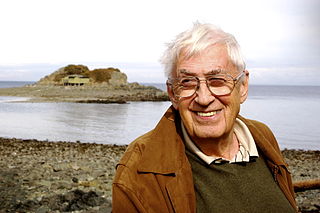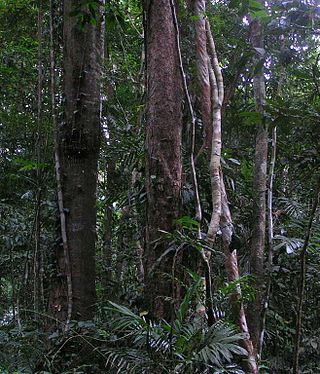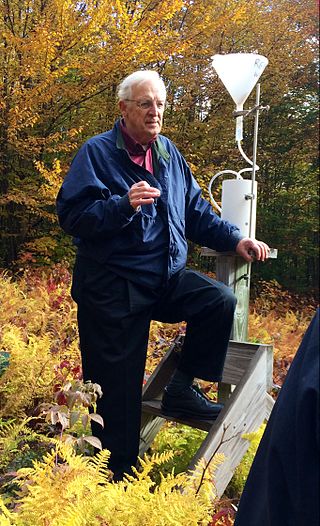Related Research Articles

Forestry is the science and craft of creating, managing, planting, using, conserving and repairing forests and woodlands for associated resources for human and environmental benefits. Forestry is practiced in plantations and natural stands. The science of forestry has elements that belong to the biological, physical, social, political and managerial sciences. Forest management plays an essential role in the creation and modification of habitats and affects ecosystem services provisioning.

Crawford Stanley "Buzz" Holling, was a Canadian ecologist, and Emeritus Eminent Scholar and Professor in Ecological Sciences at the University of Florida. Holling was one of the conceptual founders of ecological economics.

Forest ecology is the scientific study of the interrelated patterns, processes, flora, fauna and ecosystems in forests. The management of forests is known as forestry, silviculture, and forest management. A forest ecosystem is a natural woodland unit consisting of all plants, animals, and micro-organisms in that area functioning together with all of the non-living physical (abiotic) factors of the environment.
Jerome Klaas Vanclay is Professor for Sustainable Forestry at Southern Cross University (SCU), and a coordinator in IUFRO.

Gene Elden Likens is an American limnologist and ecologist. He co-founded the Hubbard Brook Ecosystem Study at the Hubbard Brook Experimental Forest in 1963, and founded the Cary Institute of Ecosystem Studies in Millbrook, New York in 1983.

The International Union of Forest Research Organizations (IUFRO) is a non-profit, non-governmental international network of forest scientists, headquartered in Austria. The aim of the organization is to promote worldwide cooperation in scientific studies embracing the whole field of research related to forests and their use and sustainable development. In 2019, IUFRO counted 630 Member Organizations worldwide.
Ian Grote Stirling is a research scientist emeritus with Environment and Climate Change Canada and an adjunct professor in the University of Alberta Department of Biological Sciences. His research has focused mostly on Arctic and Antarctic zoology and ecology, and he is one of the world's top authorities on polar bears. Stirling has written five books and more than 150 articles published in peer-reviewed scientific journals. He has written and spoken extensively about the danger posed to polar bears by global warming.
Steven W. Running, Emeritus Regents Professor of Ecology, W.A. Franke College of Forestry & Conservation at the University of Montana, and Director of the Numerical Terradynamics Simulation Group, developed the earth observing-oriented algorithms used by the Moderate Resolution Imaging Spectroradiometer (MODIS) on board NASA’s satellites, Terra and Aqua. Running's MOD17 algorithms are used to provide accurate and continuous global monitoring of the terrestrial biosphere, specifically, generating near-real-time data sets for repeated monitoring of vegetation primary production on vegetated land at 1-km resolution at 8-day intervals. These datasets are unique in that they provide global data on primary productivity and span a decade.
Brian Harrison Walker is a scientist specialized in ecological sustainability and resilience in socio-ecological systems.
Ussif Rashid Sumaila is a professor of ocean and fisheries economics at the University of British Columbia, Canada, and the Director of the Fisheries Economics Research Unit at the UBC Institute for the Oceans and Fisheries. He is also appointed with the UBC School of Public Policy and Global Affairs. He specializes in bioeconomics, marine ecosystem valuation and the analysis of global issues such as fisheries subsidies, IUU fishing and the economics of high and deep seas fisheries. Sumaila has experience working in fisheries and natural resource projects in Norway, Canada and the North Atlantic region, Namibia and the Southern African region, Ghana and the West African region and Hong Kong and the South China Sea. He received his Bachelor of Science degree with honours from Ahmadu Bello University University in Nigeria and received his PhD from Bergen University in Norway.
Hugh Graham Miller, FICFor, was professor emeritus of forestry and former head of the Department of Forestry at the University of Aberdeen. In 1981 he was awarded the Scientific Achievement Award by the International Union of Forest Research Organizations.
David L. Peterson is an Emeritus Senior Scientist with the United States Forest Service and professor at the School of Environmental and Forest Sciences, at the University of Washington. He was also a co-founder and lead scientist for the Western Mountain Initiative, a consortium of researchers known world-wide for their work on the effects of climate change on mountain ecosystems.
John D. Aber is University Professor Emeritus of Natural Resources & the Environment at the University of New Hampshire, and was also for many years affiliated with the Institute for the Study of Earth, Oceans, and Space at UNH. His fields of study included Ecosystem Analysis and Modeling, Global Change, Acid Rain, Nitrogen Deposition and Sustainable Agriculture.
Kenneth H. Mann received the first Lifetime Achievement Award of the American Society of Limnology and Oceanography in 1994.
Jamuna Sharan Singh is an Indian ecologist, academic and a former professor of botany and ecological sciences at Banaras Hindu University. He is known for his studies on the grassland ecosystems which are reported to have assisted in the better management of tropical grasslands. He is an elected fellow of the Indian National Science Academy, Indian Academy of Sciences, The World Academy of Sciences and the National Academy of Sciences, India. The Council of Scientific and Industrial Research, the apex agency of the Government of India for scientific research, awarded him the Shanti Swarup Bhatnagar Prize for Science and Technology, one of the highest Indian science awards, in 1980, for his contributions to biological sciences.
Sally Nora Aitken is a Professor and Associate Dean of Research and Innovation at the University of British Columbia. In 2017, Aitken was elected a Fellow of the Royal Society of Canada.

Reinhart Jan Maria Ceulemans is an emeritus professor of Ecology and previous director of the Research Center of Excellence PLECO of the University of Antwerp. He has been vice-dean of the Faculty of Sciences at the University of Antwerp, and was a visiting professor at the University of Washington, Seattle, USA (1987-1988), at the Université Paris-Sud XI, Orsay and at the University of Ghent. He officially retired in October 2019 and is now a visiting professor at the University of Antwerp (Belgium), a researcher at CzechGlobe Academy of Sciences in Brno and an international consultant to the Slovenian Forestry Institute.

P. K. Ramachandran Nair is an Indian American agricultural scientist, Distinguished Professor of Agroforestry and International Forestry at the School of Forest Resources and Conservation, University of Florida. He is known for his pioneering contributions to the science of agroforestry, for which he received global recognition including the Humboldt Prize (2006). The specific areas of his research include: agroforestry in the tropics and subtropics, integrated farming systems, soil carbon sequestration and climate change mitigation, ecosystem services, and soil fertility management. He has written over 200 peer-reviewed articles, 17 books and over 75 book chapters.
Jiquan Chen is a landscape ecologist, primarily focused on nutrient flux, carbon cycling, bioenergy, and grassland ecology. He currently leads the LEES lab at Michigan State University.
Nicholas Charles Coops is an Australian-Canadian researcher. He is a Tier 1 Canada Research Chair in Remote Sensing at the University of British Columbia's Department of Forest Resources Management. In 2020, Coops received the Marcus Wallenberg Prize in recognition of his work in with satellite imagery in order to make predictions about forest growth and the ability of forests to store carbon.
References
- ↑ General, Office of the Secretary to the Governor. "Dr. Hamish Kimmins". The Governor General of Canada.
- ↑ "UBC Forest Ecosystem Simulation Research Group Director". web.forestry.ubc.ca.
3. https://www.iufro.org/uploads/media/iufro-scientific-achievement-award-winners-2019.pdf